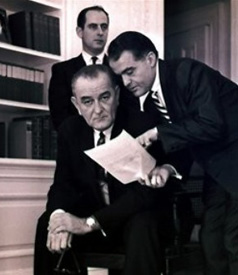
|  |  |  Editorials | Opinions | March 2009 Editorials | Opinions | March 2009  
How Not to End Another President's War (L.B.J. Edition)
 Robert Dallek - The New York Times Robert Dallek - The New York Times
go to original


| | President Lyndon Johnson. (AP) |  |
On Nov. 24, 1963, two days after John F. Kennedy's assassination, President Lyndon B. Johnson met with his principal national security advisers to consider the most volatile issue he had inherited: Vietnam. A coup at the beginning of November - approved by the Kennedy administration - had toppled Ngo Dinh Diem's government and taken his life. Concerns about the ability of his untested successors to withstand Vietcong insurgents backed by Ho Chi Minh's North Vietnamese Communist regime gave Johnson a sense of urgency about an issue that could threaten United States interests abroad and undermine his standing at home.

Johnson's first concern was to assure that he was acting in concert with Kennedy's plans. But no one could provide authoritative advice on J.F.K.'s intentions. By increasing the number of military advisers in Vietnam from 685 to 16,700, Kennedy had indicated his determination to preserve Saigon's autonomy. His agreement to a change of government in hopes of finding a leader who could command greater popular support than Ngo Dinh Diem seemed to confirm Kennedy's commitment to preventing a Communist victory.

At the same time, however, Kennedy had signaled his intentions to reduce America's military role in Vietnam by directing that 1,000 of the advisers be brought home by the end of 1963. He had also rejected requests from his military chiefs for the use of American ground forces in the fighting. In addition, he had told several advisers that he intended to withdraw American military personnel from Vietnam after the 1964 election.

Since Kennedy had left no clear indication of what he would do in response to worsening conditions in Vietnam, Johnson was free to put his own stamp on American policy. And he did not hesitate to say what he planned. He chose to interpret Kennedy's past actions as a commitment not to allow a Communist conquest. When his ambassador to Saigon, Henry Cabot Lodge, told Johnson that Vietnam "would go under any day if we don't do something," Johnson answered: "I am not going to lose Vietnam. I am not going to be the president who saw Southeast Asia go the way China went." At the Nov. 24 meeting, he urged everyone "to devote every effort" to the war. "Don't go to bed at night until you have asked yourself, 'Have I done everything I could to further the American effort to assist South Vietnam,' " he urged.

Johnson also said that South Vietnam's generals should be told that he would stand behind them, but he told his staff that he wanted something for his support. "I want 'em to get ... out in those jungles and whip hell out of some Communists," he said. "And then I want them to leave me alone, because I got some bigger things to do right here at home."

Johnson's eagerness for quick success in Vietnam rested on a number of fears. First, he worried that if Vietnam went down it would provoke another round of McCarthyism: critics would attack him for weakness in fighting the Communists and blame him for losing Vietnam the way they had blamed Truman for losing China. That could cripple his ability to be an effective foreign policy leader. He also feared that a Communist victory in Vietnam would embolden the Russians and the Chinese to new acts of aggression in Europe and Asia and increase the risks of a nuclear war. Last, but certainly not least, he worried that his hope of becoming a great reform president, who changed the domestic life of the nation, would fall victim to a foreign policy debate over Vietnam.

As Johnson soon learned, despite his protests to the contrary, he could not have guns and butter. And though, as Lady Bird Johnson said, Vietnam "wasn't the war he wanted. The one he wanted was on poverty and ignorance and disease … ", once he committed himself to winning the war with a broad bombing campaign and 545,000 combat troops, he lost the freedom to build a Great Society. Protests against the loss of American and Vietnamese lives and the commitment of billions of dollars to fight the war drained away the country's energy for large-scale domestic improvements.

Now that President Obama has inherited not one war but two, does he face a similar hurdle? With the country's economy in such poor shape and his eagerness to enact bold health insurance, education and environmental reforms, he will need to recall that wars are the enemy of far reaching change. World War I stopped Progressivism; in the 1940's "Dr. Win the War replaced Dr. New Deal," as Franklin D. Roosevelt said; the Korean War sidetracked Harry Truman's Fair Deal; and Vietnam frustrated Johnson's hopes of additional Great Society measures.

Mr. Obama's commitment to maintain perhaps 50,000 troops in Iraq after the drawdown of combat forces over the next 19 months, combined with his decision to send an additional 17,000 troops (for starters) to Afghanistan, could be the beginning of an unwanted debate about commitments abroad. If the country begins to see mounting costs in lives and money from the administration's war policies, it risks distractions from the more urgent designs the president described in his campaign and recent messages to the Congress and the country.

History is never a precise guide for current political actions. But the consistent negative impact of earlier foreign conflicts on grand projects at home is a cautionary tale that should command President Obama's close attention. Guns and butter rarely mix. |

 |
|  |



